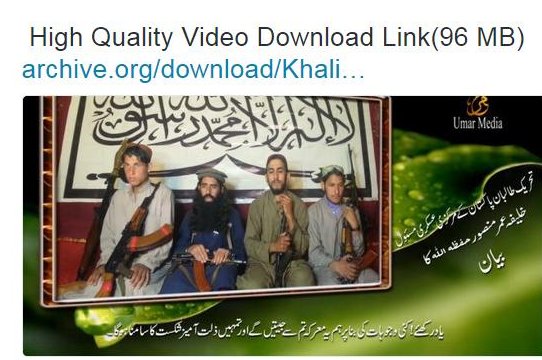1 of 2 | A screenshot from a Twitter account purportedly affiliated with Tehrek Taliban Pakistan (TTP) sharing a video message purported to show the attackers of the blast on Shiite mosque on Feb. 23 in Peshawar.
PESHAWAR, Pakistan, June 16 (News Lens Pakistan) -- Pakistan has vowed to take action against the promotion of terrorism online, but some experts say there is little the government can do about it.
Prime Minister Nawaz Sharif's government in January announced a 20-point National Action Plan to crack down on terrorism after the December massacre of 133 schoolchildren at an army-run school in Peshawar. The plan calls for "concrete measures against promotion of terrorism through Internet and social media" and declares a "ban on glorification of terrorists and terrorist organizations through print and electronic media."
The plan does not elaborate on what the "concrete measures" would be, and officials have not outlined the steps.
Tech-savvy militant organizations use Twitter, Facebook, blogs and other social media channels to post videos, press releases and speeches in support of their agenda.
A Twitter account in the name of Taliban spokesman Ehsanullah Ehsan posts written and multimedia content almost daily, in English or Pashto. While the account has a tiny number of followers by Twitter standards, at 223, it can be accessed by anyone online.
A media unit associated with the Taliban launched a Facebook page in late 2012 to recruit writers for a propaganda magazine, but Facebook shut down the page a week later, the London Telegraph reported.
There is also a proliferation of anti-Taliban sites, including several pages on Facebook. One, whose title translates to "The Taliban Are Extremists and Oppressors," has 25,420 "likes" or followers.
Minister of State for Information Technology Anusha Rehman calls online dissemination of propaganda by militant groups "cyberterrorism." She says the government has moved to block certain websites.
"Only that content would be blocked that is considered a threat to the country's security," Rehman told News Lens.
One such site is a web portal called IhyaeKhilafat, which means "reclaiming an Islamic system of government." Ehsan's Twitter account links to the portal, purported to be affiliated with the central media department of Jamatul Ehrar, a faction of the umbrella militant organization Tehreek-e-Taliban Pakistan.
However, attempts to open the site since March result in a page displaying only the message "This Account Has Been Suspended."
The government has proposed legislation that would set up an independent agency to deal with cybercrime, including the use of social media by militants.
"The government has proposed giving authority to the Pakistan Telecommunications Authority to block websites that go against the constitution of Pakistan," Rehman said.
Sana Ejaz, a Peshawar-based human rights lawyer, said militants are using social media "for the propagation of their agenda, broadcasting content against the Pakistani state."
"The social media accounts of militants should be blocked," Ejaz told News Lens Pakistan. "However, blocking is not a lasting solution as users will simply set up new accounts."
Ejaz advocates a "proper counter-response policy," that would include a dedicated think tank, she said.
"The government should establish a social media think-tank team to respond to propaganda of the militants on social media."
Farhan Khan Virk, an Islamabad-based social media commentator, said militants first start sharing religious material on Twitter or Facebook feeds to attract users, then begin broadcasting material against the Pakistani state.
"They mostly broadcast content against the Pakistani military and brand them American agents working against jihadis," Virk told News Lens.
There are 29.1 million Internet users in Pakistan, including 19.6 million "active" social media users -- 10 percent of the population, according to March data published by the global social media agency We Are Social. More than 16 million of the active social media users reach the sites using mobile devices.
Ziaullah Hamdard, a commentator and lecturer on social media studies at Abdul Wali Khan University in the northwest district of Mardan, said Pakistan has now realized that the use of social media by militants is a serious security threat.
"Extremists are really active on social media," he said.
Hamdard called for the creation of a legislative body to regulate social media usage.
Virk said he believes the government can control the presence of militants on social media by creating a team of cyber experts to report accounts that propagate content against Pakistan.
Cyber security analyst Sher Zamin Khan, who was network administrator in the Information Ministry until 2009, said he believes it is impossible for Pakistani authorities to suspend or block the account of any individual on social media platforms.
"Pakistan doesn't have the legal authority to block the account of any users" of social media platforms, Khan told News Lens.
"If there is an account they suspect is affiliated with banned outfits, the only option for Islamabad is to send a complaint request to the authorities of such platforms to block the accounts," Khan said.
"Pakistan can trace the Internet Protocol addresses of such accounts to known locations of the users," he added.
He proposed that Pakistan sign an agreement with the directors of social media platforms to authorize the government to block accounts affiliated with extremists.















